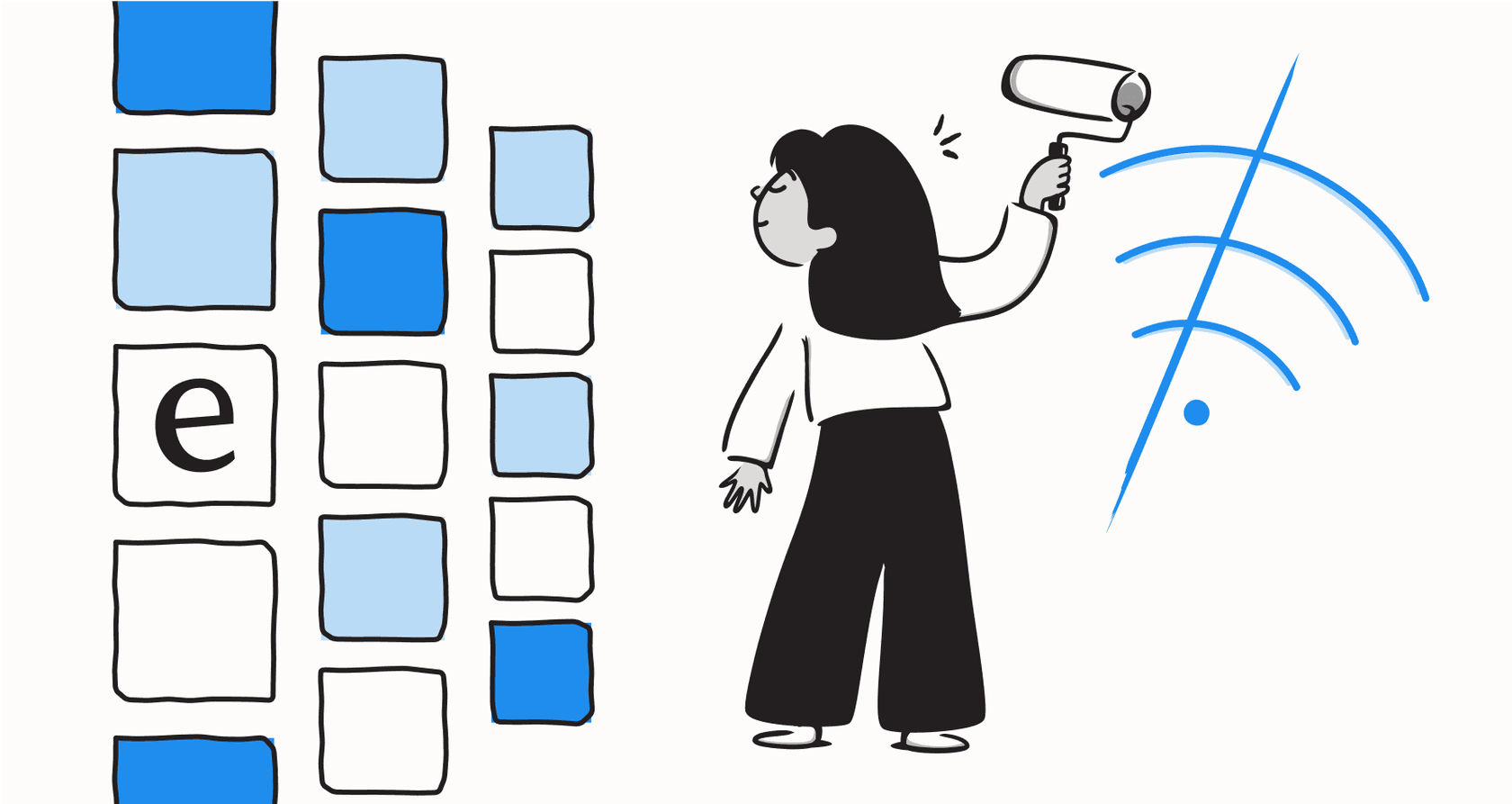
It feels like every business tool has "AI" tacked onto its name now, right? Tools promising to streamline everything from sales to customer support are popping up left and right. Lusha AI is a name you’ve probably heard, especially if you’re in the sales intelligence world.
But here’s the thing: while many tools claim to be an all-in-one AI solution, most are specialists. They’re built to do one job and do it really well. This post is going to give you a clear, no-fluff overview of what Lusha AI actually does, who it’s for, and, just as importantly, where it hits a wall.
We'll walk through Lusha AI's features for sales prospecting and then get into why you need a completely different kind of tool when you want to automate customer support and actually use your team's internal knowledge.
What is Lusha AI?
So, what's the deal with Lusha AI? At its heart, it's an AI-powered platform for sales intelligence and B2B prospecting. Its main job is to help sales, recruiting, and marketing teams find accurate, current contact info for potential leads. Think of it as a digital rolodex on steroids.
It began its life as a simple contact database and a popular LinkedIn email scraper, but it’s grown since then. To keep up with the competition, Lusha has layered in AI features that suggest new leads and even help with some basic outreach.
Its real value is all about speeding up the very top of the sales funnel. It takes the boring, manual work out of finding who to talk to and getting their contact details. But that's the key: Lusha AI is a tool for finding people, not for helping them once they’re already your customers.
A breakdown of Lusha AI's core features
To really get where Lusha fits in, you have to look at what it actually does. Let's break down its main functions.
Contact and company search
This is what Lusha is famous for. You can dig through its huge database of business contacts using all sorts of filters, like job title, industry, company size, and location. This lets sales teams zero in on the exact people they need to be talking to.
A huge part of this is the Lusha Chrome extension. If you know Lusha, you probably know the extension. You can be on someone’s LinkedIn profile or a company website, click the icon, and it pulls up verified email addresses and phone numbers. It’s a massive time-saver compared to digging around manually.
AI prospect recommendations and playlists
Here’s where the "AI" part starts to come into play. The platform looks at your ideal customer profile (ICP) based on the types of contacts you’ve searched for and saved before. Then, it uses that info to suggest new leads that fit the same mold.
Lusha also has a feature called "AI Prospect Playlists." It's a clever name for a dynamic list that keeps refreshing with new, relevant prospects. You set the rules, and Lusha’s AI keeps the list full, giving your sales team a steady stream of people to reach out to.
Lusha AI-powered recommendations deliver smarter, high-quality leads.
Intent signals and job change alerts
Timing can make or break a sale. Lusha AI tries to help teams act on opportunities by tracking buyer intent signals. For instance, it might flag a company that’s been actively researching solutions like yours online. This lets your team connect right when a prospect is already thinking about buying.
The platform also sends out job change alerts. When one of your key contacts jumps to a new company, Lusha lets you know. This is a perfect chance for a sales rep to get back in touch, say congrats, and see if there’s an opportunity at the new place. It's a classic warm outreach tactic, just automated.
Basic email outreach
Once you have your list of prospects, Lusha has a feature called "Engage" to help you kick off the conversation. It’s a simple, built-in tool for creating and sending basic email sequences. It even has an AI email assistant that can help you write copy for your subject lines and follow-ups.
It's important to be realistic here, though. This is a lightweight feature. It’s all about email and doesn’t have the complex, multi-channel options or deep analytics you'd get from a dedicated sales engagement platform, or, for that matter, a customer support tool.
The limitations of Lusha AI as a sales-focused tool
Lusha AI is a great tool for what it was built for: sales prospecting. But because it’s so specialized, it leaves big gaps in other parts of the business, especially when it comes to supporting customers and internal teams.
Finds contacts but doesn't resolve issues
Lusha AI is fantastic at helping you start a conversation. But after that, its job is done. The moment that prospect turns into a customer and has a question or runs into a problem, Lusha can’t help. It has no way to read a support ticket, answer a question about your product, or walk someone through a troubleshooting process.
This means the very conversations these sales tools help you start end up creating a ton of manual work for your support teams. They're left dealing with an influx of questions without any AI that’s actually built to help them.
Internal knowledge: Doesn't use your most valuable asset
Lusha's intelligence is built on its massive, external database of contacts. It has zero access to your team's real-world expertise, the stuff that's tucked away in your company’s brain. We’re talking about your past support tickets, internal wikis like Confluence or Notion, documents in Google Docs, and the daily chatter in Slack.
This is a really big deal. It means the AI can't give specific, accurate answers based on how your team has already solved thousands of problems. It knows nothing about your brand’s voice, your unique troubleshooting steps, or the clever workarounds your agents use every day.
Lacks true workflow automation
The automation in Lusha AI is all about finding leads and sending a few emails. It can't do the really important, time-saving tasks that support and IT teams need. It can't automatically sort incoming tickets, tag them by topic, send them to a senior agent, or perform custom tasks like checking an order status in Shopify. This isn't just a missing feature; it’s a completely different category of automation that sales prospecting tools simply aren't made for.
A better way: Unifying knowledge for real automation with eesel AI
If you’re serious about making your business more efficient, you need AI that does more than just find leads. You need it to resolve customer issues, empower your internal teams, and learn from your company’s unique knowledge. That's where a platform like eesel AI comes from a totally different angle.
Unify and activate your internal knowledge instantly
While Lusha works with external data, eesel AI connects to and learns from all your internal knowledge sources. It plugs right into your helpdesks like Zendesk and Freshdesk, your wikis like Confluence, and your documents living in Google Docs.
Right away, eesel AI starts training on your past support tickets. This is huge because it allows the AI to pick up on your brand voice, learn your specific solutions, and give answers based on what has actually worked for your customers before. It's an inside-out approach that prospecting tools can't touch.
Automate support workflows, not just sales emails
eesel AI's products, like the AI Agent and AI Triage, are built to automate the entire support process. They plug into your helpdesk to handle frontline ticket resolution, automatically tag and sort issues, and pass complex problems to the right human agent.
Even better, you can build custom actions. This lets your AI agent do actual work, like looking up order details in your e-commerce platform, processing a refund, or escalating a ticket with all the necessary context. This is the kind of deep, useful automation that actually lightens your team's workload and makes customers happier.
Pro Tip: With eesel AI, you can run a simulation on thousands of your past tickets before you even go live. This lets you see exactly how the AI will perform and gives you a data-backed forecast of your automation rate and cost savings. No guesswork involved.
Get started in minutes with transparent pricing
One of the biggest differences is how you get started. eesel AI is designed to be self-serve. You can connect your helpdesk, train the AI on your knowledge, and go live in a few minutes, all without having to talk to a salesperson or sit through a long onboarding.
This philosophy extends to the pricing. Lusha, like a lot of sales data tools, uses a confusing credit-based system where costs can get out of hand fast. In contrast, eesel AI has predictable, flat-rate pricing based on the features you need. There are no per-resolution fees, so you’re never punished when your AI does a good job. Your costs stay the same, even when you're swamped with tickets.
Lusha AI vs. eesel AI: Choosing the right tool for the job
Lusha AI and eesel AI are both powerful, but they’re built to solve completely different problems for different teams. This table should make it pretty clear which tool is right for which job.
| Feature | Lusha AI | eesel AI |
|---|---|---|
| Primary Use Case | Sales Prospecting & Lead Generation | Customer Support & Internal Knowledge Automation |
| Primary User | Sales Reps, BDRs, Recruiters | Support Agents, IT Teams, Ops Managers |
| Knowledge Source | External B2B contact database | Your internal docs, helpdesk, past tickets, etc. |
| Key AI Actions | Finds emails, recommends leads | Resolves tickets, answers questions, triages, takes custom actions |
| Core Value | Fills the top of the sales funnel | Reduces support ticket volume and resolution time |
| Pricing Model | Credit-based (per contact revealed) | Flat-rate subscription (no per-resolution fees) |
Go beyond Lusha AI prospecting and start automating
So, what's the bottom line? Lusha AI is a solid tool for sales teams that need to find and enrich contact data to build their pipeline. It does its job well. But it isn't, and was never meant to be, a solution for customer support, IT service management, or internal process automation.
Real business efficiency comes from automating entire workflows and using the expertise you already have inside your company. For teams ready to move beyond just finding leads and start actually resolving issues with AI, you need a platform built for that purpose.
Ready to see what an AI designed for support can actually do? Book a demo or try eesel AI for free and automate your first support tickets in just a few minutes.
Frequently asked questions
Yes, at its core, Lusha AI is a sales intelligence platform designed to help teams find accurate B2B contact details for prospecting. Its AI features are built around that primary goal of filling the top of the sales funnel.
The AI in Lusha analyzes your search history and ideal customer profile to recommend new prospects. It also powers features that track buyer intent signals and alert you to job changes, helping your team time their outreach more effectively.
Yes, if your goal is to manage and automate support tickets, Lusha AI is not the right fit. It's designed for lead generation and has no features for resolving customer issues, triaging tickets, or learning from your internal knowledge base.
No, it doesn't. Lusha AI operates on its own external database of B2B contacts and companies and is not designed to connect to or learn from your internal knowledge sources like wikis, documents, or communication platforms.
Not really. Lusha AI's database is for finding new leads, not for managing existing customer information or support history. It lacks integration with helpdesks and can't resolve customer issues, making it unsuitable for support teams.
Share this post

Article by
Stevia Putri
Stevia Putri is a marketing generalist at eesel AI, where she helps turn powerful AI tools into stories that resonate. She’s driven by curiosity, clarity, and the human side of technology.





